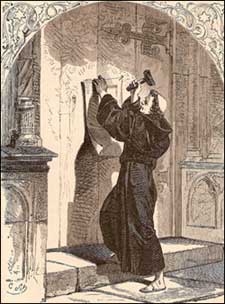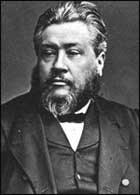Sometime this day, but only 489 years ago…
The people of Europe were preparing for All Saints Day… converging on the major cities to attend the churches so they could receive special blessings by looking on the relics, attending Mass, and by doing various kinds of penance. There was a special sale of indulgences which could be purchased excusing the buyer from various kinds of sins. Those superstitions had come to dominate the church.
It greatly troubled a monk in the German university city of Wittenberg. On the eve of all saints day he posted 95 theses for debate on the public bulletin board on the door of the castle church. In those 95 statements he challenged the church to debate its teachings and to question the biblical foundation for some of its beliefs and practices.

It was in 1517, when on October 31st Martin Luther posted his 95 Theses on the door of the Castle Church in Wittenberg. This event marked the beginning of what has come to be known as the Protestant Reformation.
Luther had identified some teachings and practices in the church which had no foundation in the Bible. He wanted those things discussed and academically debated. He wanted the church to submit its beliefs and practices to the authority of Scripture. But his goal was not only academic. He knew that ideas and practices that are not true and right, are serious dangers. They deceive and hurt needy people who are seeking Christ's help and happiness.
“The Ninety-Five Theses” were a call for debate, although a debate never took place. This call did, however, shake the people of Germany. Luther’s challenge went unnoticed for some time by the established Church, but the people did not let it die. Through the providence of God, a call to look to Scripture as the Christians’ sole authority began to ring throughout Germany and other parts of Europe. This movement… was a movement back to the Bible. The motto became Sola Scriptura (Latin for Scripture Alone) and these rebels of God began to spread the Gospel message once again to the world.
With the spread of the Reformation… we see the next great impact of the Gospel in 17th century England. It is here that we begin to see the seed bed of the Baptist movement.
http://www.reformedreader.org/history/pbh.htmThen, sometime between then and now… …Multitudes of English Christians were demanding reform in their church. They sensed that the church had become corrupt and selfish, and that it had largely left the simple message of the Bible. Several factors contributed to this clamor for reform: the teachings of such great reformers as Martin Luther in Germany and John Calvin in Geneva; the new translations of the English Bible which allowed the common people once again to read the Word of God; and social and political changes which led people to want more participation in their church.
Several English rulers in the sixteenth century sought to reform the Church of England to some extent. However, none of these reforms went far enough to satisfy those who wanted to return to the simple teachings and practices of the Bible.
One militant group within the Church of England genuinely desired to recover biblical teachings and practices. Deeply influenced by the reforms of John Calvin, they became known as "Puritans," perhaps because they insisted upon more purity of doctrine and practice in the church.
Another group seeking reform was called "Separatists." Most of the Separatists were frustrated Puritans who had given up hope of reforming the church from within. Separatists decided to separate from the Church of England and form their own independent congregations. By 1600, there were already several of these congregations in England, and they mushroomed by 1625.
The Separatists included many groups holding a variety of views. Some of them later helped populate such diverse churches as Quakers, Presbyterians, Congregationalists, and assorted independents and nonconformists. Some of these Separatists, studying the Bible, adopted believer’s baptism and became known as Baptists.
Our best historical evidence says that Baptists came into existence in England in the early seventeenth century. They apparently emerged out of the Puritan-Separatist movement in the Church of England. Some of these earnest people read the Bible in their own language, believed it, and sought to live by it. They formed separate congregations which accepted only believers into their membership, and they baptized converts upon their profession of faith. Their opponents nicknamed them "Baptists," and the name stuck.
Many people assume that Baptists got their name from John the Baptist. This is not the case. Like most religious groups, Baptists were named by their opponents. The name comes from the Baptist practice of immersion.
Perhaps the most startling practice of early English Baptists was their total immersion for baptism after 1640. Crowds would often gather to witness a Baptist immersion service. Some ridiculed… the Baptists as people who "plung’d over head and eares." The nickname "Baptist" was given to describe the people who practiced this strange form of baptism.
The first known reference to these believers in England as "Baptists" was in 1644. They did not like the name and did not use it of themselves until years later. The early Baptists preferred to be called "Brethren" or "Brethren of the Baptized Way." Sometimes they called themselves the "Baptized Churches."
http://www.baptisthistory.org/baptistbeginnings.htm No definite starting place can be ascribed to the Baptists of the Reformation. For they sprang up in many countries all at once. It is impossible to trace them first of all to any one place, for they appeared in many countries at the same time (J.C. Fusslin, Beitrage zur schweizerischen Reformations geschichte, I. 190; II. 64, 65,265, 328; III. 323. Zurich, 1754).
http://www.reformedreader.org/history/christian/ahob1/ahobc07.htmThe great reformers of Christianity—Martin Luther of Germany and Ulrich Zwingli and John Calvin, both of Switzerland—advocated a drastic return to scriptural authority in the teachings and practice of Christian churches—a significant reform but not a total one.
Some of Zwingli’s students, heartened by his teachings from the Greek New Testament (and not, significantly, from just the passages approved by the Roman church), kept reading and applied biblical precepts to their lives and ministries far beyond the reforms of their teacher. One of these more radical reforms was the practice of believers’ baptism.
Zwingli swerved violently away from the Catholic teaching that baptism has a regenerative effect. Baptism was, to him, merely a sign of joining the Christian society. He equated it with the circumcision of Jewish baby boys and further identified God’s chosen within his Zurich parish with spiritual Israel.
This understanding of baptism was as extra-biblical as the Catholic one, though perhaps not as damaging to the doctrine of salvation. His radical students were pejoratively called “Anabaptists,” or “re-baptizers.” They hated the term because they did not consider any baptism but believers’ baptism valid.
The term did associate them with an earlier heresy though, and cast them into the role of outcasts in the minds of many Germans and Swiss.
http://www.sbtexas.com/default.asp?action=article&aid=2651&issue=3/20/2006
Baptists enjoy the enviable distinction of having excited the hostility and suffered from the oppression of every dominant religious party in England, from the days of Henry the Eighth to the days of the Revolution in 1688.
It is not difficult to understand how this has happened. The Baptists argued that the Church of God should be a community of godly men; that faith is the gift of God, and not to be compelled by force of arms; that only those rites sanctioned or commanded by Christ and His Apostles are binding upon His people; and that the only Lawgiver of the Church is Christ Himself.
Each party had, therefore, its own reason for hating the Baptists; and as each had yet to learn the true nature of religious freedom, each oppressed and persecuted in turn.
The Baptists have suffered, in common with other Christian denominations, at the hands of wicked rulers, and of the Roman hierarchy. They have also suffered by themselves for their peculiar views as Baptists, at the hands of Lutherans, Episcopalians, Presbyterians, and Congregationalists; and for no one thing more than their rejection of infant baptism.
In Germany they were plundered, thrust into dungeons, banished, and numbers of them beheaded or burned alive. Torture was frequently employed to wring from the sufferers the names and abodes of their associates, or to force them to renounce the faith.
In Switzerland, in 1526, it was ordered that if any baptized others, or submitted to baptism (re-baptism, they called it), they should be drowned without mercy. Many Baptist ministers were drowned; and they held their meetings in secret, in the woods, and under cover of the night. Finally, they left the country in large numbers, going to Moravia, where, for a season, they were tolerated; but at length a law was passed expelling them, and they left, some going to Hungary, some to Transylvania, some to Wallachia, and others to Poland.
In the Netherlands, the hand of oppression was heavy on the Baptists. In 1532, three were burned at the Hague. By edicts, published in the following year, all persons were forbidden to harbor Baptist preachers in Holland; and Baptists refusing to recant were to be slain. The torture was constantly resorted to. The victims were stretched on the rack, or thumb-screws were employed, or a similar instrument applied to the ankles. No regard was paid to sex, station, or age. Under Bloody Mary, a good proportion of the martyr blood that flowed was from the veins of Baptists; and many passed to heaven through the fire.
In the early settlements of America, Church and State were united by law, and the Church sustained by taxation and State appropriations in Massachusetts, Connecticut, and Virginia; and persecutions against Dissenters were violent and severe.
Baptist churches do not have a central governing authority, resulting in the wide range of beliefs from one Baptist church to another. Baptist distinctives are beliefs that are common among Baptist churches, some of which are also shared with many other
post-reformational denominations. Some historically significant Baptist doctrinal documents include the
1689 London Baptist Confession of Faith (
Also in Tagalog-Boms), the
1833 New Hampshire Baptist Confession of Faith, and the
Southern Baptist Convention's Baptist Faith and Message, which are often used as the "official" doctrinal statements of individual local Baptist churches or the starting point for an official statement.”
See also:
List of Baptist Confessions or Doctrinal StatementsThe following
acrostic backronym, (or ‘backrostic’) spelling of BAPTIST, is used by some Baptist churches as a summary of Baptists' distinguishing beliefs:
“B” for Biblical authority. Baptists emphasize authority of the Scriptures, or
sola scriptura, and therefore believe that the Bible is the only authoritative source of God's truth. This view contrasts with the role of Apostolic tradition in the Roman Catholic Church and personal revelation in
charismatic circles. Any view that cannot be tied to scriptural exposition is generally considered to be based on human traditions rather than God's leading, and though they may be accurate, such views are never to be elevated to or above the authority of Scripture. Each person is responsible before God for his or her own understanding of the Bible and is encouraged to work out their own salvation.
“A” for Autonomy of the local church.
Congregationalist church governance gives
autonomy to individual local churches in areas of
policy,
polity and
doctrine. Baptist churches are not under the direct administrative control of any other body, such as a national council, or a leader such as a bishop or pope. Administration, leadership and doctrine are usually decided democratically by the lay members of each individual church, which accounts for the variation of beliefs from one Baptist church to another.
“P” is for Priesthood of all believers The doctrine of "
priesthood of all believers" states that every Christian has direct access to God and the truths found in the Bible, without the help of an aristocracy or hierarchy of priests. This doctrine is based on the passage found in
1 Peter 2:9 and was popularized by
Martin Luther during the
Protestant Reformation and
John Wycliff's Lollards before Luther. Baptists are encouraged to discuss scriptural and other issues with their minister and other Christians when appropriate. Ultimately the individual Christian is responsible for understanding the Bible and its application to the individual. The Baptist position of the priesthood of all believers is one column that upholds their belief in religious liberty.
“T” is for Two ordinances (baptism and the Lord's Supper) Generally, most Baptist churches recognize only two sacraments or ordinances that are to be performed on a regular basis by churches:
baptism and
communion. Some
Primitive Baptists and
Free Will Baptists also practice
foot washing as a third ordinance.
“I” is for Individual soul liberty. The basic concept of individual soul liberty is that, in matters of religion, each person has the liberty to choose what his/her conscience or soul dictates is right, and is responsible to no one but God for the decision that is made. A person may then choose to be a Baptist, a member of another Christian denomination, an adherent to another world religion, or to choose no religious belief system, and neither the church, nor the government, nor family or friends may either make the decision or compel the person to choose otherwise.
“S” is for Separation of
Church and State. Baptists who were imprisoned or died for their beliefs have played an important role in the historical struggle for
freedom of religion and
separation of church and state in England, the United States, and other countries. In 1612
John Smyth wrote, "the magistrate is not by virtue of his office to meddle with religion, or matters of conscience". That same year,
Thomas Helwys wrote that the King of England could "command what of man he will, and we are to obey it," but, concerning the church, "with this Kingdom, our lord the King hath nothing to do." In 1614,
Leonard Busher wrote what is believed to be the earliest Baptist treatise dealing exclusively with the subject of religious liberty. Baptists were influential in the formation of the first civil government based on the separation of church and state in what is now Rhode Island.
Anabaptists and
Quakers also share a strong history in the development of separation of church and state.
The original objection was opposition of the monarchy or government setting religious agenda for churches or a "National Church" and did not imply a retreat by Christians from the political realm or involvement in the political process.
“T” is for Two offices of the church (pastor and deacon). Generally Baptists only recognize two Scriptural offices, those of
pastor-teacher and
deacon. The office of
elder, common in some
evangelical churches, is usually considered by Baptists to be the same as that of pastor, and not a separate office; however, some churches, especially those in other countries such as Australia, acknowledge the position of elder, and others even dispose of the position of deacon altogether. The office of overseer or
bishop is always considered to be the same as that of pastor or
presbyter.
Baptists today are the second fastest growing
Christian denomination in the world after the
Pentecostals; largely due to the growth in Asia, Africa, Latin America and Eastern Europe in the last century.
So, back to today…
May we thank our Lord Jesus Christ, the Sovereign ruler over all eternity… past, present and future… for bringing us from where we’ve been… nurturing us where we are… and sending us where He wills. May we thank Him for the rich heritage of our church’s past, and for the ever more exceeding riches that He has prepared for His church’s eternal future: No eye has seen, no ear has heard, no mind has conceived what God has prepared for those who love Him, and We love because He first loved us.
May Heaven help us if we value the denomination of our money, more than we value the denomination of our churches.
May we thank Him for His Word and His Holy Spirit who opens our hearts and our minds to The Way, The Truth, The Life.
We thank Him for our blessed times at church and for the feeding and fellowship that we enjoy at our Bible study groups.
And then back to last Friday…
Last Friday night, Elder Robert V. led the Blacktown Care Group through Romans 16, wrapping up our 8-9 month study on the Book of Romans. We all pretty much agreed that we should all go back through it again some day, in even finer detail.
We’d like to encourage everyone to discover and keep rediscovering the gloriously humbling "righteousness from God," that
Paul wrote about in this most remarkable letter.
Please click on the link below to enjoy the Summary/Highlights of our study. God bless!
http://blacktowncaregroup.blogspot.com/2006/09/summary-of-our-studies-on-romans.html



